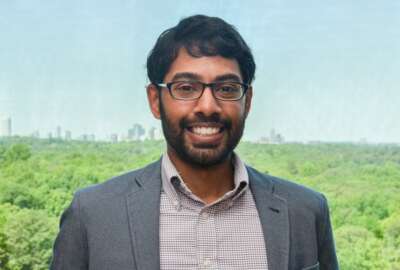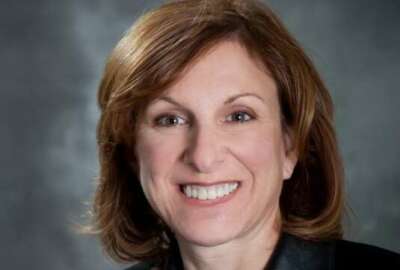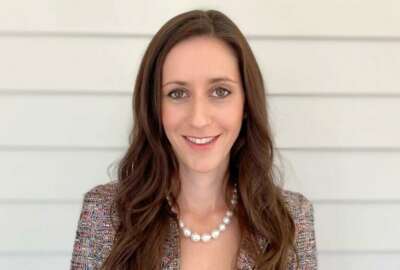
Education Dept economist earns Sammies nomination for work on K-12 practices
Elizabeth Warner is an economist at the Institute of Educational Sciences. Her work is credited with creating all sorts of best practices.
Best listening experience is on Chrome, Firefox or Safari. Subscribe to Federal Drive’s daily audio interviews on Apple Podcasts or PodcastOne.
Sometimes it takes an economist to look at things differently and make them better. That’s been the case for Kindergarten through 12th grade education and its teachers. Elizabeth Warner is an economist at the Institute of Educational Sciences at the Education Department. Her work is credited with creating all sorts of best practices, and it earned her a finalist position in this year’s Service to America Medals program. She joined Federal Drive with Tom Temin to talk more.
Interview transcript:
Tom Temin: Dr. Warner, good to have you on.
Dr. Elizabeth Warner: Good to be here.
Tom Temin: Now, this sounds a little bit like an economist walks into a classroom type of joke. Tell us what you do do. How does an economist look at education and come up with ideas that seems to be some sort of arcane art to those that practice it?
Dr. Elizabeth Warner: Well, essentially, it has to do with having the technical skills to conduct the work. So basically, we’re trying to figure out what are the most effective and efficient ways to use government funds — and we want to make sure that things are being fed the way that Congress had intended. So a lot of the evaluation work that we’re doing is just trying to figure that out. And as you said in the intro, most of my work has to do with informing teachers and what are the best ways to improve their performance and get the best teachers in the classroom so that students have the opportunities to learn that are really important for their future.
Tom Temin: Now, when I think of federal spending on education, I think me and probably a lot of people think what happens beyond school lunch programs that the federal government is invested in with respect to local school districts. Give us a sense of the range of programs that the government has an interest in.
Dr. Elizabeth Warner: Well, certainly the big ones are title one, which is to promote school improvement. Title two, which is the one that I focus on an awful lot, which has to do with improving school leaders and educators. So it can range from a whole variety of things, from getting the best ways to have teachers certified and qualified for the classroom. It’s making sure that all students have equal access to high quality teachers. Supporting teachers through professional development can also range from strategies to hire and retain the best teachers. So it’s a lot of things like that.
Tom Temin: And so how do you correlate the money that might be spent helping districts with those types of programs with the effectiveness of it? How does this all work from an economic standpoint?
Dr. Elizabeth Warner: Usually what we do is we do some things that we call implementation studies, where we learn well how are the funds used? It might be through asking state and district leaders, what are the funds being used for. We also sometimes survey teachers, but in order to figure out effectiveness, oftentimes, we figure out well what sorts of strategies are being put in place, and I’ve done a number of studies that have to do with a teacher preparation where we’ve actually provided professional development to teachers. And we’ve used what they do in the medical field called clinical trials, we assigned by lottery a certain group of teachers to get the professional development that we’re studying, and another portion to not get it. And then in that way we have created two similar groups of people. And the only difference between them is the professional development that we’re providing. And so if there are any differences in outcomes, then we know it’s can be attributed to that professional development. So that’s one way that we do it.
Tom Temin: What are some of the outcomes you might look at in order to measure whether the funds were spent effectively for that teacher development?
Dr. Elizabeth Warner: Well, for us, the ultimate outcome is student achievement because that’s one of the accountability measures that schools are being held to. But we also want to understand the mechanisms along the way. So In the example of professional development, we also want to learn, well what’s happening in the classroom? So what is the teacher practice look like? And we’ll use maybe direct observation or videos of those classrooms and then code them to sort of figure out what’s going on. We also have administered teacher knowledge tests to sort of see well how much of the professional development were we providing did they really understand that then either did or did not get into the classroom in terms of their practices? So there are a lot of different ways that we measure it.
Tom Temin: And school districts, of course, vary by income and race and outcome of students in terms of achievement levels and how many go to college and so forth. How do those external variables figure in to what is happening in the interaction between the EducationDepartment, its funds and that district when there are so much variable beyond the school classroom that you have no control over?
Dr. Elizabeth Warner: Right. Well, there are all these different variables. And that’s part of the way that we go about our evaluations that’s trying to basically control those away. We’re trying to create similar kinds of groups so that the only thing that we’re actually learning in the evaluation is the difference in what we’re studying. So for example, we might have a large group of people who have all these different characteristics but that’s going to be true for those that we provide the professional development to versus those that we don’t. So basically, our methodology is the thing that’s starting to keep those separate, still not doing a very good job with that.
Tom Temin: Well, there’s always ways to go in a lot of these endeavors. Now, economics, also known as the dismal science, studies so many things. How did you as an economist come to rest on the educational question of all the possible questions where economists come into study?
Dr. Elizabeth Warner: Well, you know, there are a lot of economists that end up being in this field. So that’s not very unusual. But for me personally, I started out as a college professor basically decided that wasn’t quite the right or best route for me. I enjoyed education, I thought education was really important. I just wanted to get at it from a different angle. And quite frankly, I spent a lot of time after leaving my position at Hamilton College as a college professor — I spent about a year trying to figure out well, what should I do with my economics degree, and through a lot of informational interviewing and that sort of thing, I was really intrigued by the department’s effort to try and use federal funds effectively and efficiently. So that’s a lot of the reason why I ended up where I did.
Tom Temin: I guess it’s fair to say that economists and educators in some ways are all at their core optimists and idealists, aren’t they?
Dr. Elizabeth Warner: (Laughing) I’m not sure that’s true. But I think that we are trying to make things better for the world. So we’re trying to figure out what are the best ways to get to where we want to go.
Tom Temin: Dr. Elizabeth Warner is an economist at the Institute of Education Sciences at the Education Department, and a finalist in this year’s Service to America Medals program. Thanks so much for joining me.
Dr. Elizabeth Warner: My pleasure.
Read more about her work here.
Copyright © 2025 Federal News Network. All rights reserved. This website is not intended for users located within the European Economic Area.
Tom Temin is host of the Federal Drive and has been providing insight on federal technology and management issues for more than 30 years.
Follow @tteminWFED





